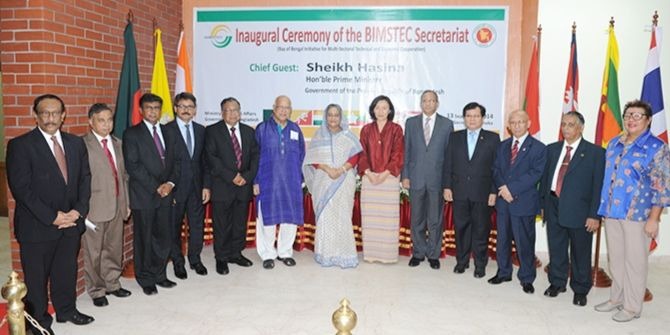China has become an increasingly active player in attempts to stabilise Afghanistan and curb militancy in Pakistan. But to what extent has China offered tangible and effective contributions to stability? Saira Basit (Norwegian Institute for Defence Studies), Neil Macfarlane (University of Oxford) and Stina Torjesen (University of Agder) argue that the evidence so far is mixed: Chinese diplomacy has made the regional dialogue more substantial, but we have seen few major improvements in security terms. Still China is continuing to successfully build power and trust in Pakistan and Afghanistan as well as with their neighbours to the north and west. What we are witnessing therefore is a Chinese state that is slowly entrenching power and legitimacy in the region for the long haul – even as it fails to alleviate Afghanistan’s immediate security needs.
A hallmark of China’s engagement with Afghanistan since 2014 has been its attention to all relevant regional players and its insistence on a broad regional dialogue. This includes considerable attention to India, which has a long standing and cooperative relationship with Afghanistan. China’s steps are significant and constructive in matters concerning Afghanistan. Still, the most interesting question perhaps at this juncture is whether China has been more successful at acknowledging and addressing the support to insurgency groups that has come from within the territory of Pakistan than countries such as the US has been. Efforts by China to curb militancy in Pakistan would both help address Afghanistan’s security woes, and it can also bring about a more stable Pakistani context in which the grand Belt and Road Initiative (BRI) can be implemented. It would also provide a more benign regional context for the restive Chinese autonomous province of Xinjiang. Has China been able to bring progress in this area?
In a more detailed analysis in the journal Contemporary South Asia we assess examples of cases where leverage on the part of China in Pakistan is demonstrated. We find that the key to China’s success in Pakistan partly owes to a long-term strategy of building bonds across all relevant fronts – from the central military and civilian leadership to political parties, provincial stakeholders and even militant groups (Duchâtel, 2011).
China conducts an inclusive policy vis-à-vis Pakistan in international settings and acknowledges Pakistan’s efforts in countering terrorism and its role as a victim to terrorism (People’s Daily Online, 2017). This policy has proved much more successful than the US policy of exerting pressure and distributing funds. Importantly, China’s leverage complements Pakistani interest. Because of the poor state of Pakistan’s economy, neither the civilian nor military leadership can afford to turn China down. It is the only country investing substantially in Pakistan’s infrastructure, despite well-known security risks. Next to the Arab Gulf states, no state has more influence on the inside of Pakistan. However, Chinese influence stops where all external benefactors’ influence stops in Pakistan: the existential threat posed by India.
By and large China accepts Pakistan’s perception of an existential threat from India and has not forcefully worked against Pakistan’s use of militants in addressing this threat. The result is, however, an inability of China to decisively contribute to Afghanistan’s full stabilisation in the short term as well as an inability to comprehensively address militancy within Pakistan. China has come much further than the US did in cajoling Pakistan to move forward in curbing militancy.
This is particularly so when militancy has threatened Chinese economic investments in Pakistan. Nevertheless, China is so far not able, despite its massive economic and diplomatic clout, to decisively shape a key BRI foci, in a way that fully safeguards their investments or substantially improves the security environment in China’s western borders.
China’s acceptance of Pakistan’s India policies is tied to the country’s overall policy of non-interference in other countries domestic affairs, laid down by Premier Zhou Enlai in 1955, and practiced comprehensively ever since, albeit with some exceptions. In Pakistan we see a pattern of soft intervention combined with impartiality and avoiding making enemies (Duchâtel, 2011). Limits to Chinese military capacities may also be noted as a further explanation for the restraint. Even if China’s overall military strengths are growing rapidly, it has a limited number of tried and tested resources that could be of assistance in curbing militancy in Pakistan or Afghanistan.
Clearly, Chinese policy makers have limitations to the kinds of tools that are available to them militarily in the region. A key point in our analysis, however, is that China could have utilised its considerable economic and diplomatic leverage much more forcefully but is demonstrating restraint also in respect to the use of these types of measures.
Implementing BRI, contributing to stability in Afghanistan and further developing its strong bilateral ties to Pakistan presents a complex policy nexus for China. We should not interpret China’s self-restraint as a sign that China is ineffective at exercising regional leadership. There is a significant difference between short term and long-term performance.
We are witnessing a Chinese state that is slowly entrenching power and legitimacy in the region for the long haul. Indeed, China has displayed a distinct failure to pressure Pakistan in a way that would create real and lasting value in the form of reduced security threats for Afghanistan. It has, however, demonstrated an ability to carefully navigate competing security interests and build trust. This bodes well for the successful implementation of BRI and for China’s long-term position as a regional leader.
This article gives the views of the authors, and not the position of South Asia @ LSE blog, nor of the London School of Economics. Please read our comments policy before posting. Photo credit: ErikaWittlieb, Pixabay
Saira H. Basit is Associate Professor at the Norwegian Institute for Defence Studies and Vice Dean at the Norwegian Defence University College, a recent article on a related theme is Terrorising the CPEC: managing transnational militancy in China-Pakistan relations, Pacific Review, 2018
Neil Macfarlane is the Lester B Pearson Professor of International Relations at the University of Oxford.
Stina Torjesen is Associate Professor at the University of Agder, Norway. She holds a DPhil in International Relations from the University of Oxford.







